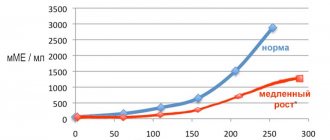Human chorionic gonadotropin (hCG) is a special hormone that begins to be produced after the fertilized egg attaches to the wall of the uterus. Based on the level of hCG, specialists can judge how well the pregnancy is progressing.
It is called chorionic because it is produced by the chorion, a structure that is subsequently transformed into the placenta, and gonadotropin because it affects the reproductive organs.
HCG has a much more powerful effect on the ovaries and uterus than the mother’s own steroids. Thanks to it, the corpus luteum begins to produce large quantities of progesterone, a hormone that supports pregnancy and creates all the necessary conditions for the development of the child.
In addition, human chorionic gonadotropin increases stress resistance and suppresses the immune system, as a result of which the body does not reject the fetus.
A decrease in hCG during pregnancy, as well as an increase in its amount, can in some cases be normal. However, sometimes this indicates the presence of a pathological process.
HCG and its functions
HCG is often called the pregnancy hormone, since it appears only after the successful implantation of a fertilized egg and is produced by the chorion, or more precisely by its trophoblast (the precursor of the placenta). The hCG level is an important indicator indicating the course of pregnancy and fetal development.
Immediately after conception, the embryo is a small bubble, the walls of which include actively reproducing cells. Some of them subsequently form the embryo, and the other the trophoblast, which develops into the chorion (the membrane of the embryo) and then into the placenta.
After successful implantation of the embryo into the endometrium, the chorion begins to synthesize hCG, which affects the body of the woman and the fetus. HCG during pregnancy is necessary to create favorable conditions for the development of the fetus, the formation of the placenta, and the activation of the corpus luteum, which is responsible for the synthesis of progesterone. It is worth noting that it is progesterone that maintains the optimal condition of the endometrium, ensures strong fixation of the embryo and its nutrition. Normally, in the absence of fertilization, the corpus luteum undergoes reverse development and resolves, but hCG helps to preserve it and stimulates its performance.
Therefore, high and low hCG are among the signs of the development of pregnancy pathology, allowing it to be identified in the early stages and prevent the formation of negative consequences, in particular fetal death.
On the importance of the indicator “human chorionic gonadotropin”
The chorion is the outer membrane of the embryo, which then becomes the “building material” for the placenta. It is this embryonic membrane that begins to produce a hormone called human chorionic gonadotropin almost immediately after the fertilized egg is implanted in the uterus, that is, attached to its wall.
Therefore, the level of hCG in the early stages of pregnancy is a reliable method for diagnosing it. When a woman, at the first signs of a possible pregnancy, does a routine urine test using a test strip, this is a simple test for hCG: it is this substance that the test reacts to. But based on the content of the hormone in the blood, diagnosis is much more accurate, since its concentration is much higher in the blood.
At later stages, this indicator is monitored in order to track how correctly the fetus is developing and whether there are any pathologies or threats. Moreover, the content of beta particles of the hormone is measured: they, unlike alpha particles, have a unique structure.
HCG norms
HCG is detected in the blood 6-8 days after successful implantation of the embryo. HCG norms are quite arbitrary and depend not only on the duration of pregnancy, but also on the number of fetuses, medications taken, methods for detecting the hormone, laboratory equipment and other factors. Therefore, each laboratory presents its own tables to interpret the results. In addition, it is recommended to carry out the hCG test in the same laboratory to obtain reliable and truthful data.
The first hCG test is carried out to determine whether pregnancy has occurred. It can be done at home using rapid tests. Of course, hCG appears in urine later than in blood, but this simple diagnostic method is available to many women and is effective in 98% of cases. In this case, using an express test, you can suspect low hCG - the strip will be dim and weakly expressed. The hormone level can also be determined by taking a blood test - this is the most accurate diagnostic method.
The second analysis is carried out at 10-12 weeks of pregnancy simultaneously with an ultrasound. It is during this period that the highest level of hCG in the blood is determined. If poor results are obtained, the test is repeated, sometimes the test is prescribed right up to the birth.
It is worth noting that not only the hCG level is important, but also the degree of its increase.
Indeed, in the first trimester, its concentration doubles every 2-3 days, reaching a maximum at 10-12 weeks. Therefore, to identify pathological conditions, tests are often prescribed at intervals of 2-3 days.
What do high hCG results during pregnancy indicate?
A so-called false positive hCG test result is also possible, that is, the hormone is present in the blood, but pregnancy has not occurred. This means that you need to carefully look for other sources of hormonal surge. And they can be quite serious, even tumors of a number of organs can give a similar “trace.” Or this occurs against the background of residual effects from previous abortions. Another option: the influence of contraceptives, especially hormonal ones.
In the early stages of pregnancy, an elevated hCG level can be a symptom of multiple pregnancy, that is, a woman is carrying two or more babies. Other likely sources of “overdose” are diabetes mellitus or early toxicosis.
The body itself takes care of the development of the baby in the womb from the first minutes of its birth. He begins to produce the much-needed gonadotropin hormone in certain quantities. After all, if hCG during pregnancy is below the established norm, this is a signal of possible pathologies. The task of the expectant mother is to closely monitor its level at different stages through a blood test. The reasons for low hCG levels during pregnancy are the topic of our article.
It just so happened that nature came up with such an event as menstrual days every month for the fairer sex. This is a clearly defined individual cycle, and any failure in it indicates any changes in the body. And the first thing that usually comes to a girl’s mind if her due date has come but her period hasn’t arrived is whether I’m pregnant. To confirm or deny the presence of pregnancy when menstruation is late, there are two ways:
- rapid test, which is carried out independently;
- blood test available only to laboratories.
Both methods are based on determining the presence of a certain level of hCG in the body. However, if for the first method the starting material is the urine of the person being tested, then in the second case the blood is tested.
Why gonadotropin? Yes, for the simple reason that although hCG is present in small quantities even in the absence of pregnancy, it begins to be rapidly produced only when:
- the egg is fertilized,
- she moved into the uterus and changed her “status” to that of an embryo.
Gonadotropin is a faithful “page” of pregnancy throughout the entire period of its course. In medicine, there are certain standards for the concentration of this protein in the body. During different periods of gestation, its level changes. And if the pregnancy is normal, the hCG level should not be too low or too high in relation to statistical indicators.
Each organism is unique, so the concentration of gonadotropin in it is different. If for one woman during pregnancy a certain hCG level is considered normal, for another it may be considered low.
The increase in hCG should be observed over time.
But there is still a certain range with a lower threshold, the violation of which during pregnancy in any case indicates a reduced level of hCG in the blood. And if during pregnancy there is a low level of hCG, this is fraught with unpleasant consequences.
Low hCG
Low hCG is an indicator that is detected in various pathologies of pregnancy and the fetus. Although it is worth noting that false negative results obtained as a result of an incorrect gestational age or laboratory errors cannot be excluded.
Low hCG is due to the inferiority of the chorion, a decrease in its functionality, hormonal disorders of the mother and fetus, placental abruption, improper attachment of the embryo and other reasons.
Low hCG is detected in the following conditions:
- Ectopic pregnancy;
- Frozen pregnancy;
- Intrauterine growth retardation;
- Risk of miscarriage;
- Fetal death;
- Chronic placental insufficiency;
- Post-term pregnancy;
- Problems of implantation after IVF (in vitro fertilization).
But human chorionic gonadotropin data cannot serve as a reason for making a disappointing diagnosis; if negative results are obtained, additional examination methods should be completed to clarify and identify the pathology.
HCG analysis
Although interpretation of protein levels is the responsibility of a gynecologist, expectant mothers should know that they are normal if the average hCG value is 2637 mIU/ml on the twenty-fourth day after ovulation. If the indicator at the specified time is within 540 mME/ml, then this is a signal that the protein level is low and not everything is in order in the woman’s body.
The analysis of hCG levels looks somewhat different if twins were detected by ultrasound. At 21 days (after ovulation), a value of 963 mME/ml is considered normal. If the indicator is only 631 mIU/ml, then this may be a cause for concern about a positive pregnancy outcome, since this value is underestimated and requires the adoption of certain emergency measures to correct the situation.
However, in medical practice, there are cases when, with protein concentrations below the established values, normal fetal development was observed, which successfully resulted in the birth of completely healthy babies.
Low hCG and frozen pregnancy
A frozen pregnancy is the cessation of development and formation of the fetus, ending in its death. It is quite difficult to identify pathology at an early stage, since symptoms of embryo death appear after several weeks. But low hCG allows one to suspect a frozen pregnancy and prevent the development of serious complications. After receiving the analysis data, it is necessary to conduct repeated studies to determine the dynamics of hCG growth.
During a normal pregnancy, an active increase in hCG levels is observed, but during a frozen pregnancy it is not typical; often the hormone level may become less than the initial data.
A slight increase in hCG concentration cannot be ruled out, but the increase in level is minimal and differs from the norm. Of course, it is impossible to say exactly the value of the hormone that indicates pathology, since each woman is individual.
Can the hCG test be wrong?
Laboratory tests can make mistakes, but this happens extremely rarely. The probability of error is negligible, but such a possibility should not be excluded. The answer can be either a false positive or a false negative.
The first option indicates that the woman’s hCG level has increased, but there is no pregnancy. Possible causes of this condition include:
- The reaction of the test to certain substances contained in the blood. Failure to properly prepare before analysis may lead to unreliable results;
- Hormone production by the pituitary gland;
- Use of hCG-based drugs. They are usually prescribed for the treatment of infertility;
- The presence of a malignant tumor.
If gonadotropin is elevated and conception has not occurred, appropriate measures must be taken.
If the level is high and ultrasound does not indicate the presence of an embryo, additional diagnostic measures should be resorted to.
To do this, the quantitative content of hCG in human urine is determined and tomography is performed. This will determine the true cause of the increase in hormone levels.
Youtube.com/watch?v=PcRay6QESgc
A false negative response indicates low levels of hCG in the blood. This may indicate both an early stage of pregnancy and the threat of its termination. The main reason for obtaining such a result is incorrect analysis. Many women who want to get pregnant take hCG too early. In this case, the procedure is repeated, but after a while. Determining the level of hCG in the early stages does not indicate pathology, but requires additional testing. Including ultrasound of the pelvic organs.
A normal pregnancy without hCG is simply impossible. For what reason the hormone is not enough and what affects its content, you need to find out with your doctor.
Low hCG and ectopic pregnancy
An ectopic pregnancy is a pathology in which the embryo attaches outside the uterine cavity: in the fallopian tubes, in the cervix or abdominal cavity. Low hCG during an ectopic pregnancy is detected after the first hormone test, including after an express test. The reduced level of hCG in this pathology is due to the defective functioning of the chorion. This is due to the fact that it can adequately perform its work only after attaching to the endometrium; in other parts there is insufficient nutrition and there are no normal conditions, so the chorion becomes weak and produces low hCG.
The dynamics of hormone growth during an ectopic pregnancy are also negative, although according to some data, low levels of hCG and its increase can be determined during normal pregnancy. Therefore, the basis for making a diagnosis is additional diagnostic methods, in particular ultrasound.
Low and high hCG levels
A decrease in hCG indicates problems with bearing a child. This may be due to ectopic fertilization. It is characterized by a decrease in the hormone by half. In this case, additional tests must be performed. An ectopic pregnancy requires lightning-fast decision making. It can be fatal. If the hCG level has dropped, there is a risk of fetal death or delayed development, frozen pregnancy or the threat of termination. The true cause of this phenomenon should be determined and the necessary measures taken.
The attending physician must decipher the test result. You shouldn't do this yourself. Due to ignorance of the specifics of the test, there is a risk of making an incorrect diagnosis. The result can be confirmed or refuted using ultrasound.
An ectopic pregnancy is the implantation of a fertilized egg in the tubes. This can cause them to rupture and cause severe bleeding. This condition is life-threatening for a woman. Elimination of ectopic fertilization entails removal of the fallopian tubes and, as a consequence, the impossibility of conceiving in the future. This condition is characterized by a slight increase in hCG, it is 2/3 below normal. From week 6 the level begins to actively decrease. A doctor can confirm the diagnosis through an ultrasound. During a frozen pregnancy, the level of hCG begins to rapidly decrease. This happens at the moment of fetal death. As soon as the hCG level drops, the woman stops being bothered by toxicosis.
An increase in the hormone in the absence of pregnancy indicates the presence of a malignant tumor. During pregnancy, an increase in hCG levels does not pose a danger to a woman. This may cause multiple pregnancies.
Low hCG, fetal growth restriction and placental insufficiency
Fetal growth retardation is a decrease in the weight and size of the child. Low hCG is a nonspecific marker of pathology, so other examination methods must be performed. But it is worth noting that this condition is preceded by placental insufficiency, which causes fetal hypoxia, impaired nutrition and blood supply, and other negative reactions.
Since placental insufficiency reduces all functions of the protective membrane, the synthesis of hCG also decreases. Therefore, based on the data obtained, this pathology can be suspected. Moreover, in its initial stages, a decrease in not only hCG, but also progesterone and prolactin is of diagnostic importance.
Low hCG during postterm pregnancy is also associated with placental insufficiency, since immediately before birth the functionality of the placenta begins to decrease, it ages, and therefore less hCG is produced.
Carrying out analysis
HCG level testing is prescribed for:
- determining pregnancy at an early stage,
- control of the gestational period and monitoring of fetal development; deviations from the norm indicate anomalies and pathological processes,
- assessing the effectiveness of therapy in pregnant women.
In order for the hCG test to be effective and not give a false answer, you should follow some rules:
- to detect pregnancy, take the test 10-14 days after the expected fertilization (not earlier),
- for greater results, it is better to donate blood for hCG from a vein,
- test on an empty stomach,
- the day before, avoid eating fatty foods,
- exclude physical activity,
- Warn your doctor about taking medications; you may need to stop them temporarily.
In emergency cases of testing, some points will not significantly affect the result (physical activity, eating fatty foods). With gestational anomalies, hCG changes significantly. When conducting an analysis, there is always a risk of a possible error; in certain cases, deviations from accepted indicators are variants of the norm.
Reference! HCG is synthesized not only during pregnancy, but also in its absence, and even in men in small concentrations. This is considered abnormal and may be a sign of hormone-producing tumors.
Low hCG, threat of miscarriage and genetic abnormalities
The threat of miscarriage may be associated with placental insufficiency, unreliable implantation of the fertilized egg, detachment of the chorion, incorrect place of its attachment and other conditions. Most of them lead to a decrease in the functionality of the chorion and placenta, which ends in a decrease in the synthesis of hCG.
HCG can act as a marker of genetic abnormalities. Often such diseases cause a sharp increase in the level of hCG, but it can decrease, in particular with Edwards and Patau syndrome. In these cases, consultation with a geneticist is necessary.
HCG drops at 9 weeks of pregnancy
HCG does not increase from 7 to 10 weeks
Girls, maybe someone had this happen, or someone monitored the hCG level at such a time. I took it on March 23, the period was about 6-7 weeks, hCG was 57479, and on April 11 it was about 9-10 weeks, hCG was 60130. When I received the results I almost died from fear, tears, snot as a result.
Moreover, I went to test my thyroid hormones, and asked for a bunch of hCG for my own peace of mind, saying it was growing and everything was fine, but what I got was the opposite. I was very scared and ran straight to the ultrasound. I understand, of course, that you can’t deal with every fear, but once you’ve experienced a miscarriage, you become suspicious. On the ultrasound everything is fine, everything is on time, the size is as it should be, the heart is beating. So what about hCG then?
Your hCG is normal. It must be taken at the same clinic as last time. If you want to watch growth dynamics, then you only need to do it on an empty stomach in the morning! Thirdly, at 8-9 weeks, hCG begins to fall. I tell you this as a person who was very puzzled by this question in the past. And if it were very high for you, you would be worried that the screening would be bad. Everything is fine with you. It’s right that we went for an ultrasound and took care of ourselves. But that’s why you were told to take hCG again. Maybe they will also ask you to do a pregnancy test? By the way, the second line becomes paler over time :)
Yes, no one prescribed hCG for me :) I myself went to take thyroid hormones and asked for a bunch of hCG, but I donate blood anyway. in invitro, the first and second time I took it in the same place.
On the contrary, I wanted to reassure myself that everything was fine with hCG. Reassured me :))))) thank you! Tomorrow I’ll ask the doctor why this is so, but it seems to me that he might be twisting his temple :))))
I registered with the housing complex at the 8th week and they took all the tests once. The second time I took everything again closer to 29 weeks. And they didn’t check my hCG level, because at first everything was fine. Not for
Source
Low hCG and normal pregnancy
Sometimes low hCG can correspond to a normal pregnancy, so you shouldn’t be alarmed by the test results, but you also shouldn’t leave everything without a doctor’s control. Reduced hCG values may be caused by incorrect gestational age, and a slight increase in concentration will appear due to the individual characteristics of the body. In some situations, low hCG is due to insufficient secretory function of the chorion. To correct this condition, human chorionic gonadotropin is prescribed as a drug.
Based on numerous studies, experts have found that the average increase in hCG over two days should be 66%. But in 15% of cases, an increase in concentration by a smaller value was observed during normal pregnancy. Scientists have proven that even with an increase in hCG by 53%, the full formation and gestation of the fetus is not excluded, and excess growth can also form in pathological conditions.
You can get tested for hCG and conduct other studies for the treatment of infertility at the IVF Center clinic in Smolensk.
What is hCG and what is it responsible for?
Human chorionic gonadotropin plays an important role in the development of the fetus and its further gestation. This hormone begins to be synthesized in chorion cells. Around week 12, his growth rapidly increases. The main function of the hormone is to prevent miscarriage. If a low level of hCG is observed, it means that abnormalities have occurred in the body and development of the embryo. Human chorionic gonadotropin is an important hormone; without it, pregnancy cannot proceed normally.
After IVF, its level can be monitored already on the 7th day. By this time, the egg has time to attach to the endometrium. The hormone level is also checked during delays, especially if the girl was planning a pregnancy. To summarize, it is worth noting once again what functions it is needed for:
- responsible for bearing the fetus;
- participates in the process of fixation of the embryo to the endometrium;
- allows you to save the embryo.
If its level is abnormal, it is worth looking for the cause of this manifestation.
HCG in pregnant women
How does hCG increase during pregnancy? In a normal scenario, the hCG level should increase at a fairly rapid pace. After the third week, the value is expected to double daily until week 12. Then a slight decline, and new growth until childbirth.
The hCG level itself has little effect, since the range of normal values is quite wide. The dynamics of hCG during pregnancy plays a huge role. Simply put, you need to establish how and at what rate hCG grows during pregnancy, and whether this growth corresponds to the norm.
For example, with a reduced rate of increase in hCG, a frozen pregnancy is most often diagnosed. But an increased level of hCG during pregnancy may indicate a multiple pregnancy or chromosomal abnormalities.
During pregnancy, single measurements of hCG are practically useless; only the dynamics of changes are indicative.
Laboratories may work according to their own hCG standards, so comparing results from different laboratories is also pointless.
Toxicosis is directly related to hCG levels. That is why at the beginning of pregnancy, when the level of hCG just begins to increase, toxicosis manifests itself fully, and after 10-11 weeks, when the concentration of hCG is maximum, it weakens and then completely disappears.
At what week does your baby start to have heart palpitations?
The formation of the heart in the embryo occurs in the 4th obstetric week.
It looks like a hollow tube, and already in the 5th week the first contractions of the organ, which has not yet fully formed, are noted. The vital organ begins to beat not sharply, but gradually, as if adjusting the rhythm. The period from 4 to 10 weeks, during which the heart develops, is very important for the health of the child. Deviations in the development of a muscular organ are possible due to genetic abnormalities, early maternal diseases, and exposure to toxic substances. In order not to miss pathology, the obstetrician listens to the embryo's heart during each appointment. Without an ultrasound sensor, this can be done from 18-20 weeks.
HCG began to decrease at 9-10 weeks
Even though I don’t even remember taking an hCG test at 9 weeks, it doesn’t seem to make any sense anymore. Also at 10 weeks I was in storage with a hematoma, so no one told me to take hCG, they just kept it.
Indicator (pm - from the date of the last menstruation) Minimum Maximum Non-pregnant women 0 5.3 Pregnancy 3 - 4 weeks 16 156 Pregnancy 4 - 5 weeks 101 4870 Pregnancy 5 - 6 weeks 1110 31500 Pregnancy 6 - 7 weeks 2560 82300 Pregnancy 7 - 8 weeks 23100 151000 Pregnancy 8 - 9 weeks 27300 233000 Pregnancy 9 - 13 weeks 20900 291000 Pregnancy 13 - 18 weeks 6140 103000 Pregnancy 18 - 23 weeks 4720 80100 Pregnancy 23 - 41 weeks 2700 78100
Everything is fine, that's how it should be! I also remember that I panicked, but at the end of the eighth I started to fall. The ultrasound reassured me - the placenta takes over its functions, and so the hCG drops. In general, they don’t give exams at this time – it’s not informative. If you are really worried, take a quick look at the hearts on an ultrasound and you will be calm))
Hello, Author and that's all)))) I looked at my hCG - at week 9 - 204964, and then I took it at week 11 - 149793. Something like this :-) But after 8-9 the hCG should already decrease! Health to everyone :-)
Now while I was writing, I remembered that because... I was in storage and didn’t take the hCG. They sent it to me by email. In short, at the end of the 9th week there was a decline, we went for an ultrasound - everything was ok, then I just passed it at 11th for myself :-)
I don’t understand, since you are already taking hCG tests now (why?), then why look up the information on hCG on the Internet, and not in the standards of your particular laboratory? Everything is fine with you, stop worrying, otherwise you won’t have time to enjoy your pregnancy.
Don’t worry, it may already be on the decline! I took the test for the last time at 8 weeks, then the doctor said there was no point in taking it! After all, at 12 weeks blood is already donated for risks, and the hCG there should no longer be high!
why does your stomach hurt before your period? week of pregnancy Painful sensations in the lower abdomen accompany the onset of menstruation in most women. However, pain varies. If it disrupts the usual rhythm of life, makes you faint and does not go away after taking painkillers
I even have
Source
First signs of pregnancy Confirmation of pregnancy Express pregnancy tests HCG during pregnancy Measuring basal temperature










